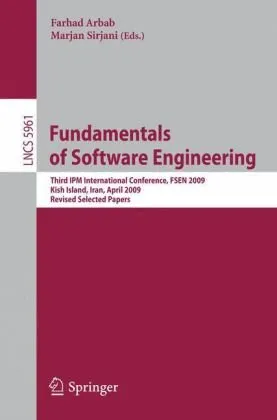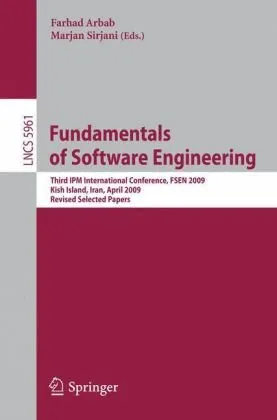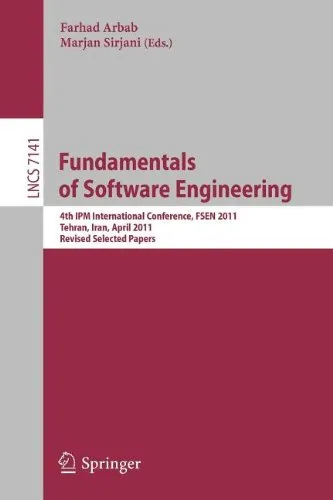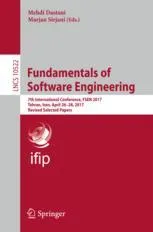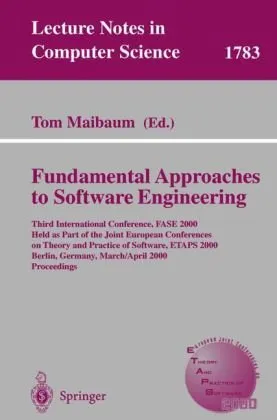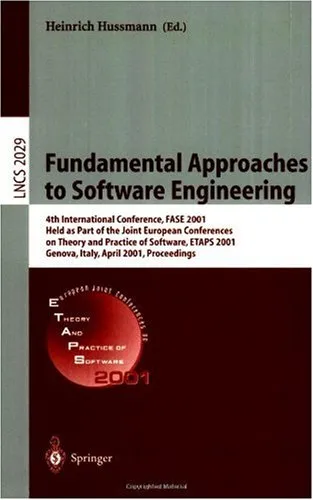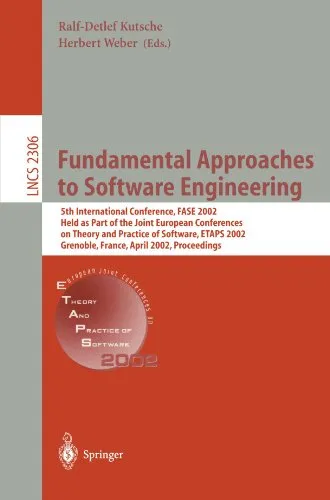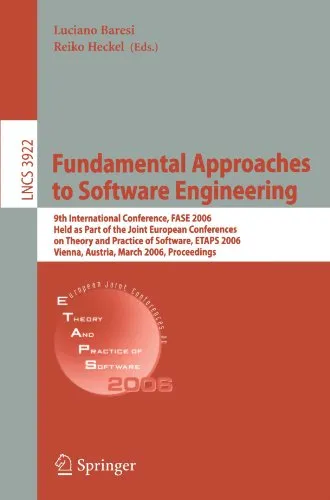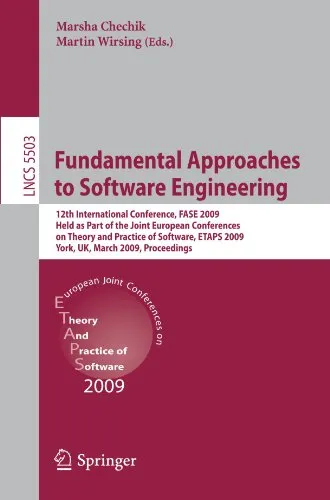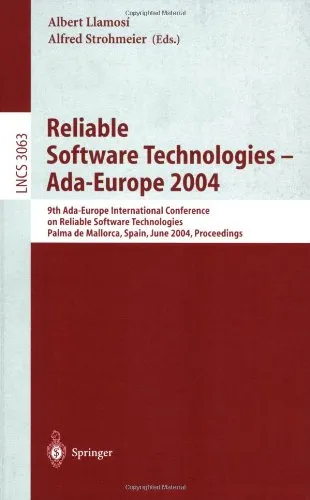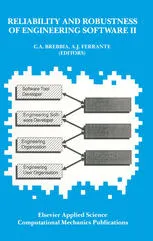Fundamental Approaches to Software Engineering: Second International Conference, FASE’99, Held as Part of the Joint European Conferences on Theory and Practice of Software, ETAPS’99, Amsterdam, The Netherlands, March 22-28, 1999. Proceedings
4.0
بر اساس نظر کاربران

شما میتونید سوالاتتون در باره کتاب رو از هوش مصنوعیش بعد از ورود بپرسید
هر دانلود یا پرسش از هوش مصنوعی 2 امتیاز لازم دارد، برای بدست آوردن امتیاز رایگان، به صفحه ی راهنمای امتیازات سر بزنید و یک سری کار ارزشمند انجام بدینکتاب های مرتبط:
مقدمهای جامع بر کتاب "Fundamental Approaches to Software Engineering"
کتاب "Fundamental Approaches to Software Engineering" یا به اختصار FASE، یکی از شناختهشدهترین منابع علمی در زمینه نرمافزار است که در دومین کنفرانس بینالمللی با همین نام، برگزارشده در چارچوب کنفرانسهای مشترک اروپایی در نظریه و کاربرد نرمافزار (ETAPS’99) ارائه گردید. این کنفرانس از تاریخ ۲۲ تا ۲۸ مارس ۱۹۹۹ در آمستردام هلند برگزار شد و این کتاب مجموعهای از مقالات پژوهشی است که در آن به بررسی جنبههای بنیادی مهندسی نرمافزار پرداخته شده است.
این کتاب توسط Arie van Deursen، Paul Klint و Chris Verhoef تدوین شده است و ویرایش نهایی آن توسط Jean-Pierre Finance صورت گرفته است. هدف اصلی این مجموعه، فراهم کردن بستری مناسب برای گردهمایی دانشمندان، پژوهشگران و حرفهایها در حوزه مهندسی نرمافزار بود تا بتوانند ایدهها و روشهای نوآورانه خود را در زمینه تحلیل، طراحی، توسعه و نگهداری نرمافزار ارائه دهند.
این کنفرانس و به تبع آن این کتاب، نمایانگر پیشرفتهای عمده در روشهای علمی و عملیاتی برای درک و بهبود فرایندهای توسعه نرمافزار است. موضوعات مطرح شده در این کتاب از software modeling و formal methods گرفته تا program analysis و نرمافزارهای توزیعشده را شامل میشوند.
خلاصهای جامع از محتوای کتاب
این کتاب شامل مجموعهای از مقالات علمی است که هر یک به شیوهای دقیق و کامل به بررسی موضوعات مهم در مهندسی نرمافزار میپردازند. از جمله موضوعات پوشش داده شده میتوان به موارد زیر اشاره کرد:
- توسعه رویکردهای formal برای سنجش کیفیت نرمافزار
- استفاده از روشهای modeling پیشرفته در طراحی نرمافزار
- کاربرد program analysis برای بهبود نگهداری نرمافزار
- بهینهسازی فرایندهای نرمافزاری در سیستمهای توزیعشده
هر مقاله در این نسخه، دارای ارجاعات علمی فراوانی است که نشاندهنده عمق پژوهش و تخصص نویسندگان است. همچنین، چالشهای عملی و نظری در زمینۀ توسعه نرمافزار به صورت عمیق و با استفاده از مطالعات موردی (case studies) مورد بحث قرار گرفته است.
نکات کلیدی یادگیری از کتاب
- درک عمیق از مفاهیم formal methods و کاربردهای آن در سنجش صحت نرمافزار
- کسب مهارت در استفاده از ابزارهای پیشرفته برای software modeling
- چگونگی تحلیل نرمافزار با هدف شناسایی مشکلات و بهبود عملکرد
- دانش در مورد برنامهریزی برای سیستمهای توزیعشده و پیچیده
- فهم اهمیت collaborative approaches در توسعه نرمافزار مدرن
جملات معروف از کتاب
"The complexity of software systems requires not only innovative solutions, but also rigorous and formalized methods to address challenges."
"The interplay between theory and practice in software engineering is the key factor for sustainable development."
چرا این کتاب اهمیت دارد؟
کتاب "Fundamental Approaches to Software Engineering" نقش حیاتی در پیشرفت علمی و کاربردی مهندسی نرمافزار ایفا میکند. این کتاب نه تنها به پژوهشگران اجازه میدهد که به جدیدترین فناوریها و روشها دسترسی داشته باشند، بلکه به توسعهدهندگان نرمافزار کمک میکند تا از بهترین شیوهها (best practices) در پروژههای خود بهره ببرند. اهمیت دیگر این کتاب در این است که موجب تقویت ارتباط بین نظریه و عمل در مهندسی نرمافزار میشود. در مجموع، این کتاب منبعی ارزشمند برای هر کسی است که میخواهد در زمینۀ مهندسی نرمافزار پیشرفت کرده و نقش برجستهای در این حوزه ایفا کند.
Introduction
Welcome to the proceedings of the Second International Conference on Fundamental Approaches to Software Engineering (FASE’99), held as part of the Joint European Conferences on Theory and Practice of Software (ETAPS’99) in Amsterdam, The Netherlands, from March 22–28, 1999. This book captures the dynamic discussions, groundbreaking research, and innovative methodologies deliberated upon during this hallmark event.
Software engineering stands as a cornerstone of modern technology, playing a pivotal role in shaping various industries. The need for robust, scalable, and fundamentally sound software systems has never been greater. With FASE’99, we explore the synergy between theoretical foundations and real-world practices, uniting researchers, academics, and practitioners to bridge this critical gap. This volume presents a rich tapestry of ideas that address fundamental challenges, enabling readers to grasp state-of-the-art tools, techniques, and conceptual frameworks central to software engineering today.
Detailed Summary of the Book
This book compiles the proceedings of the FASE’99 conference, featuring numerous high-quality papers selected through meticulous review by a panel of esteemed experts. Covering a broad spectrum of topics, the book advances the field of software engineering by addressing key issues such as software system specification, design, testing, and maintenance. Key thematic areas include methodologies for requirements engineering, the role of formal methods in enhancing software reliability, advancements in software testing strategies, and the integration of tools that streamline development processes.
Each section of the proceedings highlights innovative approaches to long-standing software engineering problems. Topics such as model-based techniques, component-based software architecture, and the influence of programming paradigms are explored in depth. The inclusion of case studies and empirical results provides valuable insights into the practical applications of theoretical concepts, ensuring relevance for both academia and industry professionals.
Key Takeaways
- The critical interplay between theory and practice serves as the foundation for advancing software engineering methodologies.
- Formal approaches to software specification minimize ambiguities, boost reliability, and facilitate verification throughout the software life cycle.
- Leveraging component-based architectures significantly enhances software modularity, maintainability, and reuse.
- Cutting-edge testing strategies, such as model-based testing, are instrumental in ensuring software quality and robustness.
- The development and adoption of automated tools play a crucial role in improving the efficiency and effectiveness of software engineering practices.
Famous Quotes from the Book
"Software engineering thrives at the intersection of clear theories and practical execution, where innovation and rigor coalesce." - Arie van Deursen, Paul Klint, and Chris Verhoef
"A fundamental approach to software engineering is not an option; it is the gateway to building reliable, maintainable, and adaptive systems in an ever-changing digital world." - From the proceedings
Why This Book Matters
The proceedings of FASE’99 stand out as a seminal contribution to the field of software engineering. In today’s fast-paced digital landscape, this book addresses the pressing need for systematic and methodical approaches to software development, which are essential for building resilient systems. By providing invaluable insights into foundational and emerging topics, it serves as a critical resource to software engineers, researchers, and students alike.
The content presented in this book transcends academic discussions, offering practical implications that can shape the future of how software systems are conceived, developed, and maintained. Furthermore, the inclusion of formal methods emphasizes the importance of precision and correctness. Participants of FASE’99, and now readers of this book, are equipped with a deep understanding of the methodological foundations needed to address the complexities of software engineering in real-world applications.
In sum, this book is more than just a collection of conference proceedings—it is a testament to the enduring relevance of rigorous, foundational research and its impact on guiding us toward innovative solutions that redefine the boundaries of what software engineering can achieve.
دانلود رایگان مستقیم
شما میتونید سوالاتتون در باره کتاب رو از هوش مصنوعیش بعد از ورود بپرسید
دسترسی به کتابها از طریق پلتفرمهای قانونی و کتابخانههای عمومی نه تنها از حقوق نویسندگان و ناشران حمایت میکند، بلکه به پایداری فرهنگ کتابخوانی نیز کمک میرساند. پیش از دانلود، لحظهای به بررسی این گزینهها فکر کنید.
این کتاب رو در پلتفرم های دیگه ببینید
WorldCat به شما کمک میکنه تا کتاب ها رو در کتابخانه های سراسر دنیا پیدا کنید
امتیازها، نظرات تخصصی و صحبت ها درباره کتاب را در Goodreads ببینید
کتابهای کمیاب یا دست دوم را در AbeBooks پیدا کنید و بخرید
1199
بازدید4.0
امتیاز0
نظر98%
رضایتنظرات:
4.0
بر اساس 0 نظر کاربران
Questions & Answers
Ask questions about this book or help others by answering
No questions yet. Be the first to ask!


